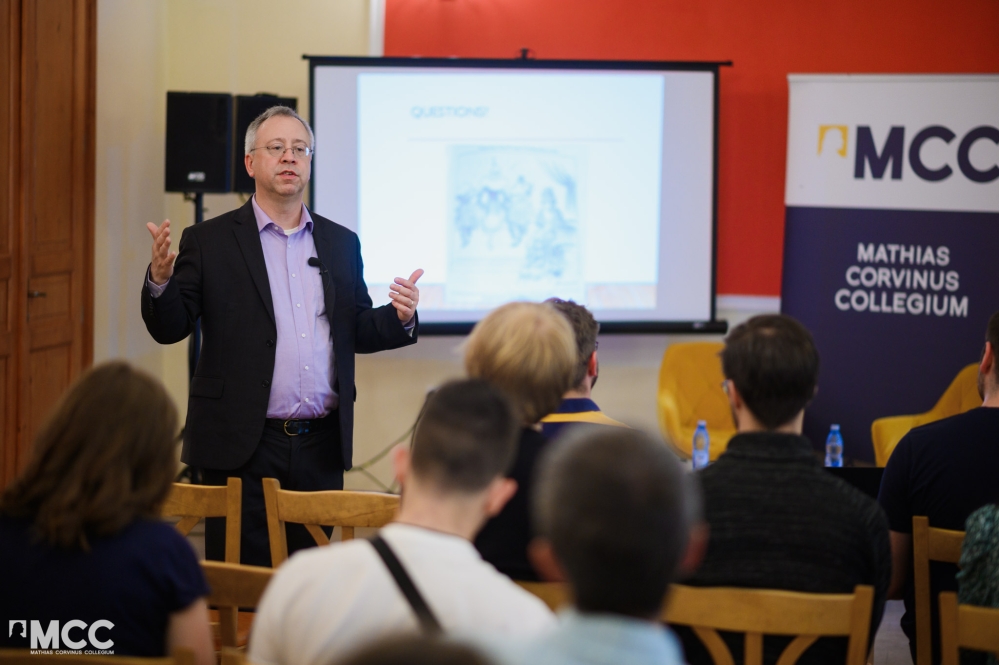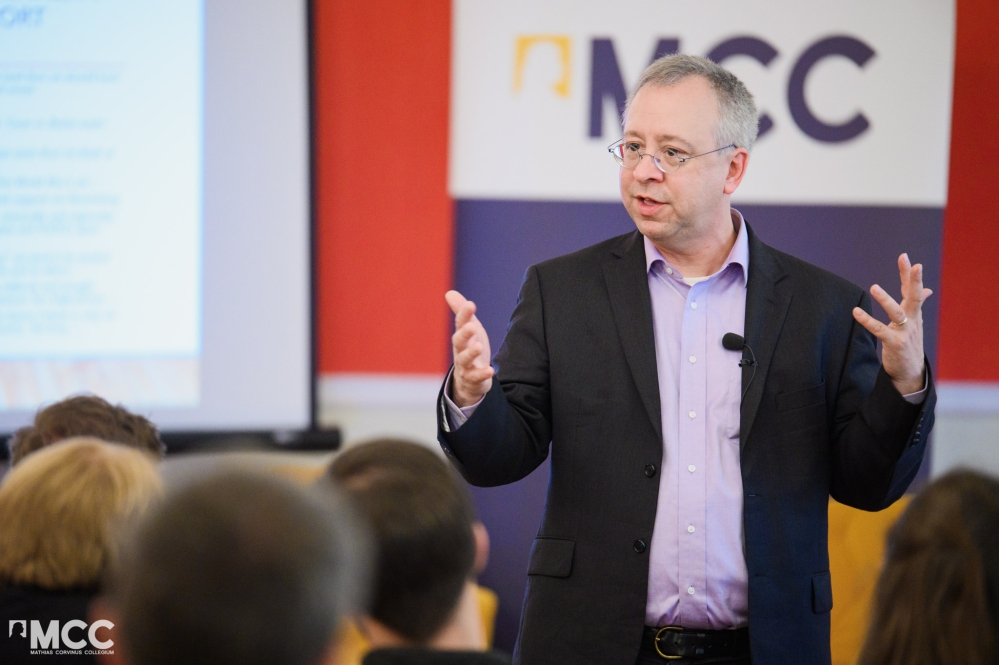Reading time: 5 minutes
One of the most pressing issues in international politics today, the war in Ukraine has a major impact on global security and stability. As part of the MCC Budapest Peace Forum, William Ruger, President of the American Institute for Economic Research, presented the current US foreign policy on the Russia-Ukraine war and the US approach to the war at Kolozsvár/Cluj-Napoca on June 7.
William Ruger is the former vice president for research and policy at the Charles Koch Institute and a vice president for foreign policy at Stand Together. He was previously an associate professor in the Department of Political Science at Texas State University and an adjunct assistant professor at the LBJ School of Public Affairs at the University of Texas‐Austin. His most recent scholarship examines the relationship between military service, combat experience, and civic participation. Ruger is a veteran of the Afghanistan War and was awarded the Defense Meritorious Service Medal, among other decorations. He remains an officer in the U.S. Navy (Reserve Component). Ruger was nominated to serve as the U.S. Ambassador to the Islamic Republic of Afghanistan and was a prominent advocate for ending America’s participation in the war there.
In his lecture, William Ruger explained the main elements of the US grand strategy, and discussed the approach of US foreign policy to current geopolitical issues. The lecture was moderated by Máté Sükösd, a student of the MCC University Program. William Ruger first described two types of approach in US foreign policy: restraint and primacy. A grand strategy is a state's strategy of how means can be used to advance and achieve national interests. Its key elements are territorial integrity and security, the creation of conditions for economic prosperity, and constitutional order. However, there is no single grand strategy that can be applied universally, as states are too diverse.
William Ruger argued that for the last 25 years, the U.S. has based its foreign policy on a sense of primacy and idealism rather than restraint and realism, failing to recognize the human and economic cost of international military and political intervention, and has tended to damage both its own domestic security and the countries where it has intervened.
But what are the principles of restraint and primacy? The supporters of primacy believe in actively spreading American values and democracy around the world and intervening when they don't think a country's system is right, even if it has nothing to do with the United States. This attitude would not, for example, allow Europe to become too distant or independent from the U.S. According to William Ruger, this is an aggressive attitude, whose adherents are happy to discuss the successes of the last seventy years, but do not talk about the big problems, such as Vietnam, Afghanistan or Iraq. This year, the US is spending nearly a trillion dollars on war, when it is not an economically productive activity, he pointed out, adding that some people have benefited from US military interventions, but the nation is not getting rich. Instead, overseas interventions have caused instability and led to the accumulation of domestic debts.
In contrast, those arguing for restraint demand that the United States significantly reduce its overseas interventions and avoid involvement in foreign conflicts. The US, with its nuclear arsenal, strong navy, air force and space force, has the strength to emerge as the dominant party from conflicts, but this is not a reason to intervene, since intervention does not always serve the national interest. Ukraine, for example, is not vital to US national interests, and while personally pro-Ukrainian, the war is not an existential threat to the US, the speaker acknowledged. For America, the only worrying fact in the conflict is Russia's nuclear power. Unfortunately, sooner or later Ukraine will have to accept some territorial changes and compromise for peace, in order to minimize the nuclear threat.
William Ruger pointed out that NATO's expansion eastwards has created a security dilemma. If America had recognised Russia’s zone of influence, war could have been avoided. Calling Ukraine and Georgia NATO territory is very provocative, and some Western politicians have done just that. "It is not right to tell another country how to manage its national interests. America has to be very careful in expressing its views on the policies of other states," he said. He believes it is sometimes necessary to step in, to make sacrifices, to stand up for an ideal, but the US should not fight this war.
Asked about Western sanctions, William Ruger said that they do not help to achieve peace. They lead to a lot of expenditure and as the war continues the costs are rising. In the West, many people are only in favour of maintaining sanctions because they want to punish Russia, but it is the civilian population that is feeling the impact and it is causing difficulties worldwide. That is why there is a great need for peace, but as long as one side sees war as preferable to peace, they will fight. So far, neither side is inclined towards a diplomatic solution, so we could be looking at a long war, with huge economic damage and human cost, which will accelerate escalation, William Ruger stressed.
The international conference organized by the Mathias Corvinus Collegium aims to discuss different perspectives on peace. The multi-city discussions will bring together speakers from around the world. The panel discussions will cover topics such as possible scenarios for peace, the United States' policy regarding the war, the energy crisis, theoretical questions of state sovereignty, and warfare in the 21st century. The conference will also address Asian aspects, transforming spheres of interest, and their impacts.


